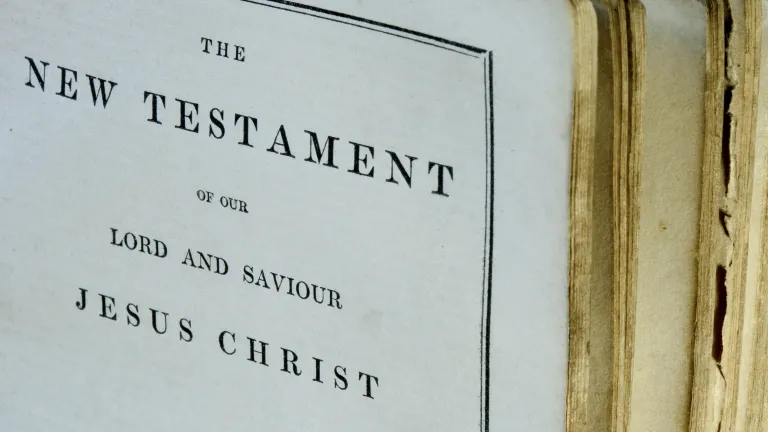The God Who Became a Human Being

How could someone who is spirit, having lived for all eternity in the past, become human? Was Jesus a human being just like us? And when He was a human being, was He still God?
How could someone who is spirit, having lived for all eternity in the past, become human? Was Jesus a human being just like us? And when He was a human being, was He still God?
Jesus was prophesied to be "God with us" (Matthew 1:23). Jesus was a human being and He was also God. There was never a time when He ceased to be who He always was. His identity did not change. When He was in the womb of Mary, He was God. When He was a baby boy lying in the manger, He was God. When He was a youngster growing up in Nazareth, He was God. And when He was dying, He was God.
"And the Word became flesh and dwelt among us" (John 1:14).
As a spirit being, prior to His human birth, He was infinite in knowledge, power and presence. As God He would know everything and have unlimited power to act on any object, anywhere. But if He was human, He could not do everything. He would be limited to the normal abilities any normal human being would have. He could not have been both infinite and finite simultaneously.
A physical body with physical limitations
When Jesus became flesh He was still God in terms of His identity, but He was nevertheless a human being in every sense of the word.
Jesus had a physical body. His closest disciple attests that He was a physical person: "That which was from the beginning, which we have heard, which we have seen with our eyes, which we have looked upon, and our hands have handled, concerning the Word of life—the life was manifested, and we have seen, and bear witness" (1 John 1:1). John is establishing the humanity of Jesus Christ when he says they heard, saw and touched Jesus.
He had a fully human body. He was born. He grew and developed just like any other child.
Jesus was subject to the same physical limitations as other human beings, because He had the same kind of body. He experienced hunger when He fasted (Matthew 4:2) and thirst (John 19:28). He experienced fatigue from a long walk (John 4:6).
Jesus suffered physically and died. Hebrews 2:10 tells us that He was made "perfect through sufferings." Physiologically, He was a human being just as we are human, subject to death. "Since, therefore, the children share flesh and blood, he himself likewise shared the same things, so that through death he might destroy the one who has the power of death, that is, the devil" (Hebrews 2:14, NRSV). He was made flesh "that He ...might taste death for everyone" (Hebrews 2:9).
Jesus suffered terribly when He died, as is evident in the crucifixion accounts. When the spear was thrust in His side, water and blood poured out. His body was the same as ours. There can be no doubt that He felt physical suffering as genuinely as we do when He was beaten and scourged, when the crown of thorns was shoved onto His head and when the nails were driven into His wrists and feet.
Jesus felt human emotions
Jesus also experienced many of the same emotional and intellectual qualities we do. He thought, reasoned and felt the full range of human emotions. He had strong affection for people (John 11:5; John 13:23; John 19:26). He felt compassion and pity for those who were hungry or physically or spiritually afflicted (Matthew 9:36; Matthew 14:14; Matthew 15:32; Matthew 20:34).
He could be distressed and troubled, as was evident to His disciples when He anticipated His impending suffering and death (Luke 12:50; John 12:27). He was deeply troubled when considering that one of His disciples would betray Him (John 13:21). He grieved and wept over the mourning of Lazarus' family and friends when Lazarus died (John 11:33-35).
Jesus was "deeply distressed" and "exceedingly sorrowful" and didn't want to be left alone when He was struggling with His thoughts and feelings just before His arrest (Matthew 26:37-40). Obviously Jesus possessed the same human capacity to feel sorrow and anguish as deeply as we sometimes do.
He also experienced joy (John 15:11; John 17:13). He could be angry and grieved with people's attitudes (Mark 3:5) and indignant toward His own disciples (Mark 10:14, NRSV).
Jesus' intellectual abilities
Yet the Gospels clearly reveal that Jesus had knowledge of the past, present and future in a way that was far beyond what any ordinary man would have. However, these remarkable abilities were not something that He had inherently. They were given to Him by the Father. As Jesus clearly said, "I can of Myself do nothing" (John 5:30)—that is, nothing supernatural on His own. We will explore this idea more when we discuss the works of Jesus.
What are some of the ways Jesus had knowledge beyond normal human abilities? We first see this when, at the age of 12, He showed understanding far beyond His age in His discussions with the teachers at the temple (Luke 2:46-47).
He knew the thoughts of both His friends (Luke 9:47) and His enemies (Matthew 9:4). He knew the Samaritan woman had five husbands and at the time was living with a man to whom she was not married (John 4:18). He knew that Lazarus had died from his illness even though He and the disciples were miles away (John 11:1-14).
He knew which disciple would betray Him long before Judas had made the decision to turn Jesus over to those who wanted to kill Him (John 6:70-71). He told Peter that he would deny Him three times on the night He was arrested and that a rooster would crow after the third denial (Luke 22:34).
At the same time, He did not know everything. There was knowledge that He did not have and therefore asked to find out. He inquired from the father of the child who had the mute spirit, "How long has this been happening to him?" (Mark 9:21). When Jesus gave the amazing prophecies about the end of the age and His return, He acknowledged that He did not know the exact time of His coming. "But of that day and hour no one knows, not even the angels in heaven, nor the Son, but only the Father" (Mark 13:32).
Jesus here is relying on the Father to present Him with the time of His return. This helps us to understand that the Father also gave Him the understanding of the hearts of men, prophetic events and other information that He wasn't told.
Jesus constantly depended on God the Father for guidance on what to do, what to say and how to answer, for insight into the hearts of men and for anything else the Father might see fit to give to Him. He relied on God the Father for help to obey, to have power over demonic spirits and to have strength to resist and overcome temptation.
Sometimes He prayed for long periods (Luke 5:16; Mark 1:35). Before choosing the 12 apostles He prayed all night (Luke 6:12-16). On the night before His crucifixion, He prayed repeatedly in the Garden of Gethsemane and the Father sent an angel to strengthen Him during this terrible ordeal (Luke 22:41-44).
Hebrews 5:7 tells us, "In the days of his flesh, Jesus offered up prayers and supplications, with loud cries and tears, to the one who was able to save him from death, and he was heard because of his reverent submission" (NRSV). As a human being, Jesus trusted the Father completely for the strength He needed to prevail against the forces that worked so fervently against Him.
Could Jesus have sinned?
This brings us to another question about Jesus' humanity. Was it possible for Jesus to sin? The Bible is quite clear that Jesus did not sin. Paul says that Jesus "knew no sin" (2 Corinthians 5:21). John confirms that "in Him there is no sin" (1 John 3:5). None of His enemies could convict Him of sin (John 8:46).
But could He have sinned? Hebrews 4:15 tells us that "we do not have a High Priest who cannot sympathize with our weaknesses, but was in all points tempted as we are, yet without sin." If it wasn't possible for Jesus to sin, then was His temptation genuine?
It's more fitting to say that while He could have sinned, it was certain that He would not. He faced genuine struggles and temptations, but refused to give in to the temptation to sin.
When He was tempted of the devil for 40 days and nights (Luke 4:1-2), was this real temptation or merely a pointless exercise? One could hardly say that His "prayers and supplications, with loud cries and tears, to the one who was able to save him from death" were not a result of experiencing strong temptation.
Such a time came when He prayed under such duress immediately before His arrest that, "being in agony, He prayed more earnestly. Then His sweat became like great drops of blood falling down to the ground" (Luke 22:44). Jesus then urged His disciples to "rise and pray, lest you enter into temptation" (Luke 22:46).
For Jesus to fully know how human beings have to deal with sin, "...he had to become like his brothers and sisters in every respect, so that he might be a merciful and faithful high priest in the service of God, to make a sacrifice of atonement for the sins of the people. Because he himself was tested by what he suffered, he is able to help those who are being tested" (Hebrews 2:17-18, NRSV).
How could He be our example if He wasn't human and therefore wasn't tempted exactly as we are? This is why He had to be tempted in every way as we are. Yet He went beyond. If a person yields to temptation, he has not felt its full power, but has given in while he has yet more to resist. Only the one who successfully prevails against a particular temptation and remains sinless knows the full extent of that temptation.
Was He really God?
We have explained that Jesus was God as the Bible explicitly says (John 1:1). What was the difference, then, between how He was God prior to His human birth and when He was a human being?
Paul addresses this very question in Philippians 2. Paul tells us what He left behind and what He took upon Himself. "He, who had always been God by nature, did not cling to his privileges as God's equal." Instead He "stripped himself of every advantage by consenting to be a slave by nature and being born a man" (Philippians 2:6-7, NTME).
Philippians 2:8 tells us that "he humbled himself by living a life of utter obedience, to the point of death, and the death he died was the death of a common criminal" (NTME).
In taking on the form of a human being, Jesus gave up the independent exercise of His attributes that He had when He was with the Father. This doesn't mean that He lost them but that, to become truly human, it was necessary that He voluntarily give up the ability to exercise them on His own. And having given them up, He no longer had these attributes inherently while a man. Indeed, as quoted above, Jesus clearly said He did not have the ability to perform supernatural works on His own: "I can of Myself do nothing" (John 5:30). He could exercise the attributes of divinity only in submission to the will of the Father.
Jesus performed many wondrous works, but He emphatically told His disciples that "I do not speak on My own authority; but the Father who dwells in Me does the works" (John 14:10). Again and again, Jesus declared that the works He did were the Father's, not His own, and He pointed to the works as proof that He had been sent from the Father (John 10:32, John 14:37-38).
While in prior centuries Jesus had authority to speak as YHWH of the Old Testament, He now spoke and acted under authority to God and in full dependence on Him. "Most assuredly, I say to you, the Son can do nothing of Himself, but what He sees the Father do; for whatever He does, the Son also does in like manner" (John 5:19).
The One who existed with the Father from before the beginning of the universe, now as a human being, explained the relationship: "I do nothing of Myself; but as My Father taught Me, I speak these things" (John 8:28).
Jesus' salvation
Jesus placed His entire future squarely in the hands of the Father. The self-existing One now would have no life unless it were through the Father (John 6:57). If He were to again have eternal life, He would now have to obtain it as a human being, in the same way you and I would achieve salvation—through submission to the Father and the resurrection from the dead.
Hebrews 5:9 explains that Jesus became "the author of eternal salvation" by experiencing the process of salvation as a human being—with one exception. Jesus didn't have to repent of sin. But He did have to remain sinless. And "though He was a Son, yet He learned obedience by the things which He suffered" (Hebrews 5:8).
He was always obedient. Yet His obedience and character were tested and strengthened through hardships and trials. "And having been perfected, He became the author of eternal salvation to all who obey Him" (Hebrews 5:9). He was already perfect before His human birth. Now He was perfected as a human being. He is "declared to be the Son of God ...by the resurrection from the dead" (Romans 1:4). However, He already was the Son of God by virtue of who He was (Romans 1:3).
It becomes clear that "in all things He had to be made like His brethren" (Hebrews 2:17).
The enormity of the sacrifice Jesus made becomes difficult for us to comprehend when we realize the position He voluntarily put Himself in. His very existence was on the line. If Jesus had sinned, then who would be the sacrifice for Him? If He had made a choice to sin, just once, He would have incurred the penalty of death—death for all time. The very law that He spoke Himself as God from Mt. Sinai would require it.
Could God die?
When talking about God, some people don't like to consider the possibility that God could die. How could God cease to exist? As an infinite, immortal spirit Being, He couldn't. But if He volunteered to become a human being and to possess all the attributes of human nature and a physical existence, then He could die. And indeed He did die—and when He died, He was really dead. If He wasn't really dead, in the same way we would be dead if someone killed us, then it couldn't really be a genuine substitution—His life for ours.
It would have been only make-believe, an illusion. Not only did Jesus die, but He also could have died the death from which there was no resurrection—the death of a sinner without any redemption.
His salvation was through the Father in whom He had complete confidence. That relationship was one that could only be described as total, complete and utter trust in and reliance on His Father (John 8:29). Jesus submitted His will to His Father (John 6:38). He asked for no glory as a human being (John 17:5). He was obedient all the way to His death (Philippians 2:8).
He put His salvation on the same basis as ours. We have a forerunner, an example, an author of salvation, a captain of salvation. Who He would forever be hung in the balance of a few short years on earth (Philippians 2:8-11).
Was there ever a doubt in the outcome? There was none—not because He couldn't fail, but because He and the Father knew what each could do and would do. The strength of God is the greatest strength there is, and the faith of Jesus was absolute. It is the same faith through which we are saved (Galatians 2:20, KJV).







